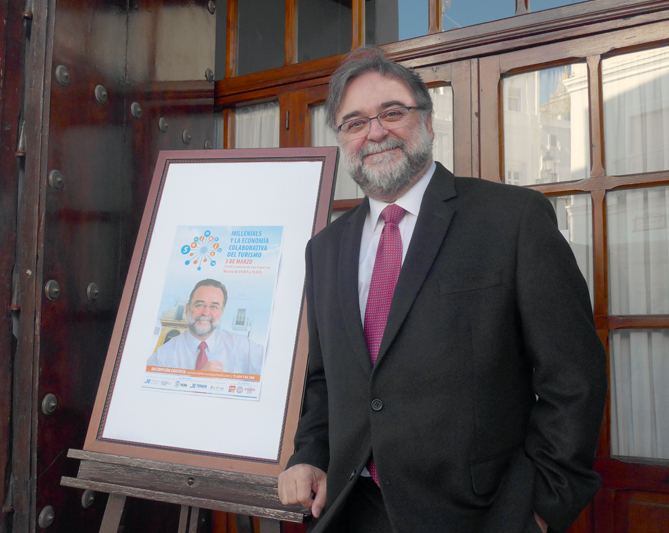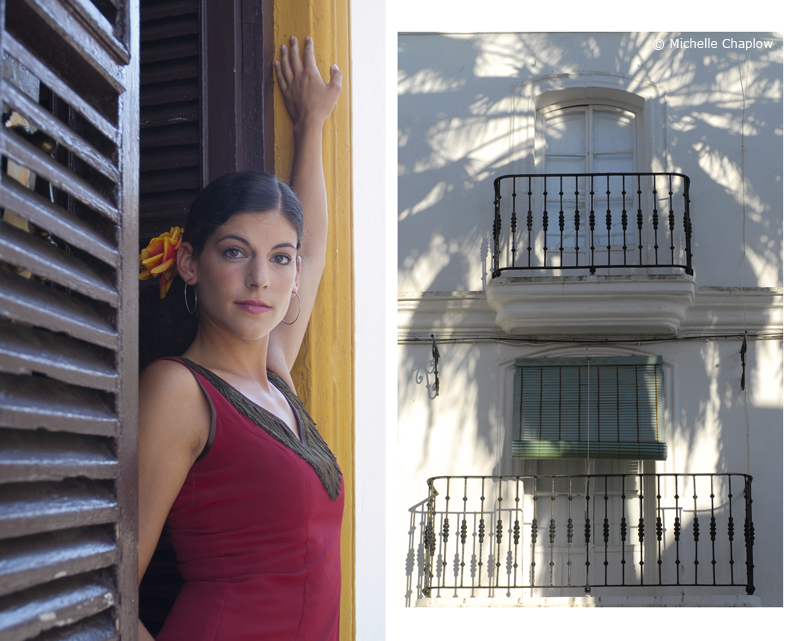By Michelle Chaplow
A seminar by Francisco Gallardo on Millennials and the collaborative economy in the tourism sector
Fernando Gallardo is a highly respected hotel critic, with decades of experience; he is a journalist, writer, columnist and entrepreneur – one of those early adopters. He is also Founder of Hoteles Con Encanto, and Founder and CEO of Notodohoteles.com.
Fernando has now launched his own roadshow as a keynote speaker and trend forecaster in the key sector of tourism. With 26,000 hotels visited in 102 countries over a 36-year career, this man can indeed call himself an expert in the field, so I was curious to hear his predictions first-hand.
Of all the towns in all the world, the hilltop village of Vejer de la Frontera, in the province of Cadiz, Southern Spain, was included on his schedule. Vejer is one of those small, supremely picturesque villages – what international visitors consider the “Real Spain”.
Vejer is now one of the gastronomic epicentres of Andalucia, with a diverse range of eateries, from gourmet markets to tasty tapas bars, as well as boutique stores where you can buy your foodie gifts to take home.
So what mood did Fernando convey to the audience of 50 tourism professionals? Well, in my opinion he delivered one key message: hope.
Let me give you three examples:
- Employment and the Millennials
In recent years Andalucía has had the highest rate of unemployment in Europe at 34.8% and in youth unemployment, the exact age group of Millennials, this figure according to Fernando has risen to a shocking 54%.
Millennials is a marketing term sometimes coined as Generation Y. This is a demographic group born between the early 1980s and the early 2000s, who will be decision-makers of the world economy in the next 10 years.
Fernando conveyed hope, telling us that the (Spanish) Millennial generation are not like their parents – they will not expect the government to provide them with steady employment; their dream is not to be a civil servant and stay in the same job for 40 years.
The Millennials are an educated generation, many to university level, some even have two or three degrees, yet have never had a job. They want flexibility; they are optimistic; they have no desire to attend long face-to-face meetings; they are naturally independent; their status symbol is not the flash car, but instead their dreams are in technology – phones, tablets, watches. The Millennials think differently; they are wired-in and have contact networks in their online world; they are connected 24/7/365. With this infrastructure, Fernando predicts that over the next decade they will create their own jobs, working together in the new collaborative economy.
I am with Fernando on this and hope it can happen. My only concern is that the economic barrier to entry is too difficult for those starting out. I´m talking about self-employment social security and book-keepers’ fees in Spain, some of the highest in Europe. Spain is one of only two EU countries with no minimum threshold required for VAT registration. With government support the Millennial generation could indeed be the catalyst for growth in the Andalucian economy.
- The restrictive effects of Spanish opening hours
Fernando was born in the Spanish city of Melilla on the Moroccan coast; he grew up in Madrid and now resides in New York and has a broad, international outlook on life.
It is 5.30pm as I write this blog in Spain; 11.30am in New York; and 3.30am the next day in Sydney. As one society sleeps, another is working – in the shared economy, as a back-end programmer rests, the designers can work on the front end. Sharing and collaborating on the same project at different times of the day, this can move a project forward rapidly.
Fernando mentioned that when he arrives in Spain from New York and sees shops closed at midday or in the evening, for a milisecond he wonders why the shops aren’t open during waking hours. He also predicted that if commercial opening hours are not changed, consumers will be forced to buy online more and more. Fernando can make an order in New York with Amazon Prime (free delivery), and items such as lettuce can arrive in 20 minutes; living in a skyscraper it would take longer to go to the store. He said that up to three trailers arrive at his building in the Big Apple every day to deliver Amazon products.
After more than 20 years in Spain, I still have trouble figuring out why there should be a 2pm shut down, the long closure for lunch and the reopening at 4 or 5pm. It still bothers me as it has to be negative for the economy, not to mention Sunday opening hours.
Fernando predicted that the Millennials will take advantage not only of the opening hours here in Spain, but also world time zones, this again brings hope to the new shared economy in Spain.
- The hotel industry
“The Millennial generations are not buying bed nights, they are buying experiences.” Fernando quoted a survey saying that wifi in a hotel is more important than hot water to the Millennial sector – they are continuously wired in.
Millennials are looking for a local experience – the bakeries with special breads and cakes; they are not interested in an anonymous hotel style buffet.
Airbnb is a prime example of the shared economy, where owners rent out their apartments to visitors. The largest hotel brand in the world is Marriot, valued at $27,500 million; Airbnb is now valued at $25,500 million; and the second-largest hotel group in the world, Hilton, is valued at $18,300 million.
The shared economy is skyrocketing; Fernando predicted that next year Airbnb may even overtake Marriot.
Hotels of the future #hotel2020
Fernando explained that hotels of the future, if they are going to survive, need to be less “hotel-like”.
- The architecture needs to appeal to the senses – the Millennials are buying those experiences not beds. Colours/textures/flowers/decor
- Hotel Photography – Photos that convey sensations / experiences / transparency.
- Hotels need to have a local flavor – in many of my blog posts I have mentioned how important it is to highlight the hotel’s location and have geo-identifiers within the hotel, reminding guests of their location and culture.
- Intuitive service – with technology and big data hotels can get to know their clients well.
- Hotels with various accommodation options – establishments which can offer single rooms, double room, suites and apartments will be the future according to Fernando.
- Instagram effect – the collaborative Millennials want to share their experiences, so hotels need to be attractive to the grammers – starting with having their own account.
These are just a few of the trends that Fernando predicted.
A summary of Fernando’s forecasting
Fernando has a track record of being an early adopter and his seminar held the attention of 50 people from 9 in the morning until 9 in the evening, talking about the collaborative market and the online-savvy Millennials.
- Millennials are at one with the shared economy – as an educated, optimistic generation they will create their own employment.
- The Millennials in Spain will not want restrictions on commercial opening hours, which will lead to change.
- Hotels will adapt to the demands of the new Millennial generation, who in turn themselves will be running the show. #Hotel2020
A fun optimistic outlook indeed.
Thanks Fernando for a fascinating day.


